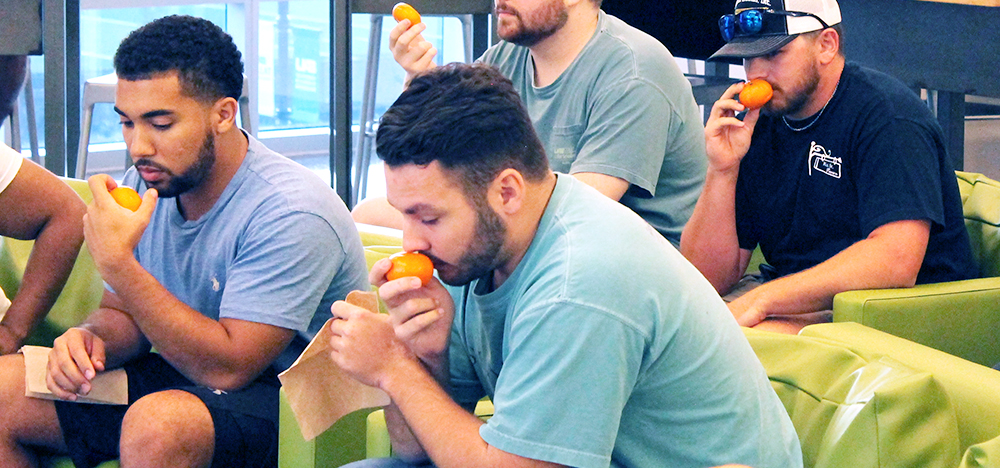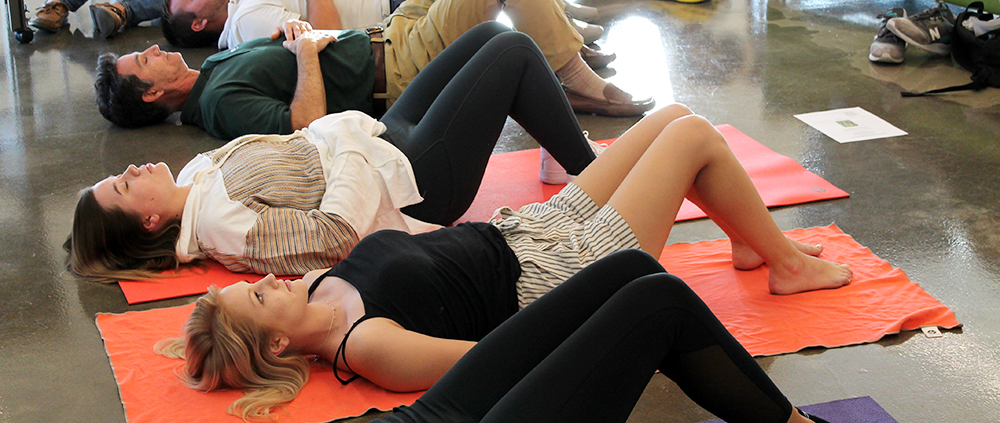| “[Mindfulness] teaches students a valuable skill in learning to deal with stress, which is considered the key reason people get burned out in their job.” |
When you think of meditation, what benefits come to mind? Perhaps better focus, less stress or calmness? For some students, it can mean better grades and a more fulfilling career.
That’s the message from Kristine Hurst-Wajszczuk, DMA, associate dean for the UAB Honors College and associate professor of voice in the College of Arts and Sciences Department of Music. She recently walked students through a series of guided meditations and mindfulness exercises to promote better focus and retention.
The students were enrolled in the new Creative Solutions in Distribution class, a required course for students within the Collat School of Business Industrial Distribution program. Led by Thomas DeCarlo, Ph.D., professor and Ben S. Weil Endowed Chair of Industrial Distribution, the course seeks to amplify students’ abilities to drive growth opportunities for business through innovative methods.
“ID students will go work for companies that distribute products that include the Internet of Things (e.g., multiple web-enabled smart functionalities). These new products require a more consultative sales process that includes creating new customer solutions. The information from this class will help students when they implement the creative process,” DeCarlo said. “For example, the information will help them become more mindful of being present to observe customer responses without injecting their own biases or thoughts to what they hear.”
Students engaged in an eating meditation during which each one was given an orange and asked to experience every sensation, from smelling to peeling to eating. Information from this class will help students when they implement the creative process, Professor Thomas DeCarlo says — to "become more mindful of being present to observe customer responses without injecting their own biases or thoughts to what they hear.”
Putting theory in practice
Hurst-Wajszczuk, a mindfulness practitioner of more than 10 years, is trained in Koru Mindfulness, a form geared to young adults. As the director of opera for the UAB Department of Music, she leverages her background in mindfulness to teach students to navigate their thoughts — positive and negative — to better adjust to life’s challenges and channel anxiety into constructive energy during shows and competitions.
DeCarlo met Hurst-Wajszczuk on campus and after learning about her background in performance-anxiety management, asked her to speak to his class.
For students such as Sara King, better focus and calmness means a better career trajectory. “We have a lot of interviews [in the industrial distribution major],” says King, a senior in the program and chair of the Collat Business Honors program. “Just being able to be less stressed about an interview is a great benefit.”
In a recent class, King and 16 fellow students were guided through a series of mindfulness exercises that included lying comfortably on yoga mats or sitting in a chair and focusing on breathing. Hurst-Wajszczuk walked them through a creative exercise in which they were asked to envision their favorite place and the associated sounds, colors and surroundings. Afterward they engaged in an eating meditation during which each student was given an orange and asked to experience every sensation, from smelling to peeling to eating, mindfully.
Initially, some students were skeptical, but others told Hurst-Wajszczuk they felt calmer and more relaxed. Even DeCarlo, who joined the students in the exercises, felt a noticeable difference.
In a recent class, students were guided through a series of mindfulness exercises that included lying comfortably on yoga mats. Even DeCarlo, who joined the students in the exercises, felt a noticeable difference.
“[Mindfulness] teaches students a valuable skill in learning to deal with stress, which is considered the key reason people get burned out in their job,” he said. “It is surprising to me that business schools typically do not provide this type of training in light of the amount of job-related stress people experience. So, this class might just help students deal with the ups and downs that occur in a career.”
Before Hurst-Wajszczuk begins her guided meditations, she first discusses the numerous physical and mental benefits from a regular mindfulness practice. According to the Center of Koru Mindfulness, students who practice regularly report feeling less stress, less self-judgment and increased focus and mindfulness. All of this leads to better test scores, says Hurst-Wajszczuk.
| “It was the most unique class I’ve had so far in college. I have found myself already using some of the techniques she taught us on how to be present in my daily life.” |
In fact, students who regularly practice mindfulness can experience a 16% increase in memory retention, Hurst-Wajszczuk says. When presenting the benefits to students, she often relates mindfulness to test performance.
“Who wants to score a 100 up from an 84 on their next test?” she asks. Many students usually raise their hands.
King says she thoroughly enjoyed the class.
“It was the most unique class I’ve had so far in college,” King said. “I have found myself already using some of the techniques she taught us on how to be present in my daily life.”
